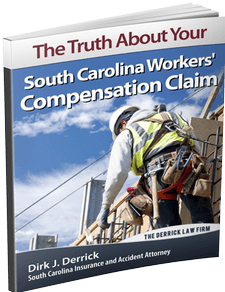What to Do If You Develop TNS on the Job
If you have a job that requires daily repetitive motion and you notice the symptoms of TNS described above, you should take the following steps immediately:
- Report your condition to your supervisor or a claims representative in your workplace. Although you have 90 days to do so, you should not delay.
- If your employer does not file a claim for you with the South Carolina Workers' Compensation Commission (SCWCC) in a timely manner, do so yourself by using Form 50 from the SCWCC website. You actually have two years to file your claim, but you should do so immediately. Any delay on your part in reporting or filing gives the employer’s insurer ammunition to dispute your claim in order to save money.
- See a doctor certified and recommended by your employer’s insurer (not your own doctor).
- Follow the doctor’s advice and treatment plans to the letter and take all medications as prescribed.
- Keep all medical appointments and retain receipts and documentation of all your treatments.
- Contact a workers’ comp attorney right away if your employer is slow to approve necessary treatments or denies your claim.
You do not have to prove that your employer did anything wrong to cause your injury or illness; in fact, you may file a claim for benefits even if you caused your own accident. Your employer may not fire you for filing a claim.
Accidental Injury vs. Occupational Disease
Because an accidental injury occurs in one moment, often with visual evidence and witnesses to verify it happened on the job, it’s hard for your employer or its insurer to dispute your injury claim. An occupational illness, on the other hand, can develop over time without clear evidence of exactly when or how it started. For this reason, it’s harder to prove an occupational disease than it is to prove an accidental injury. Your employer might insist that your TNS resulted from non-work-related activities or a pre-existing condition and deny your claim.
When this happens, the services of an experienced workers’ comp attorney are highly recommended to help you fight back and seek the benefits you need and deserve. Your lawyer can organize your medical evidence, present it convincingly, and bring in expert witnesses if necessary for an informal conference. If your employer and/or insurer continues to dispute your claim, your attorney can request a hearing before the SCWCC or a Commission Review. If a favorable decision is still not forthcoming, your case can be appealed.
There Are a Few Exceptions
While most employees are eligible for workers’ comp, there are some exceptions: independent contractors, sole proprietors, members of limited liability corporations (LLCs), some commissioned real estate agents, and Federal employees of the state (who have their own Federal workers’ comp system). There are also some employers who are not required to carry workers’ comp insurance: companies with fewer than four employees or a yearly payroll of less than $3,000, agricultural businesses, railroads, and county or state fair associations.
If your employer is not exempt but still does not carry workers’ comp insurance, you might be able to seek compensation for your work-related injury or illness from the SC Uninsured Employers Fund (UEF). If the UEF accepts your claim, it can then try to recoup the benefits it pays you through a lien against your employer’s assets. While you may not file a civil lawsuit against an employer who carries workers’ comp, you might be able to sue an employer who is supposed to be covered but is not.
When You Might Have a Third-Party Lawsuit
Even if you do collect workers’ comp benefits from your employer for your TNS claim, you might still be able to file an insurance claim or lawsuit against a third party who was fully or partially responsible for your work-related condition. If, for example, an outside cleaning service spilled liquid on the floor and caused you to fall and injure your neck, you could seek compensation for the one-third of your wages not covered by workers’ comp or for your pain and suffering, which workers’ comp does not cover. In any of these cases, a workers’ comp attorney can guide you through the complex process of seeking fair benefits for your work-related TNS.
|
Related Links: |

 If you’re injured in the course and scope of performing your job duties in Florence, SC, you’re entitled to file a workers’ compensation claim with your employer’s insurance company. Nearly every South Carolina business or company with four or more employees is required to carry workers’ comp, which is no-fault insurance that covers employees’ work-related injuries and occupational diseases. Unlike a work-related injury that occurs at the time of an accident, an occupational disease can develop over time due to repeated activities or unhealthful conditions in the workplace environment.
If you’re injured in the course and scope of performing your job duties in Florence, SC, you’re entitled to file a workers’ compensation claim with your employer’s insurance company. Nearly every South Carolina business or company with four or more employees is required to carry workers’ comp, which is no-fault insurance that covers employees’ work-related injuries and occupational diseases. Unlike a work-related injury that occurs at the time of an accident, an occupational disease can develop over time due to repeated activities or unhealthful conditions in the workplace environment.


